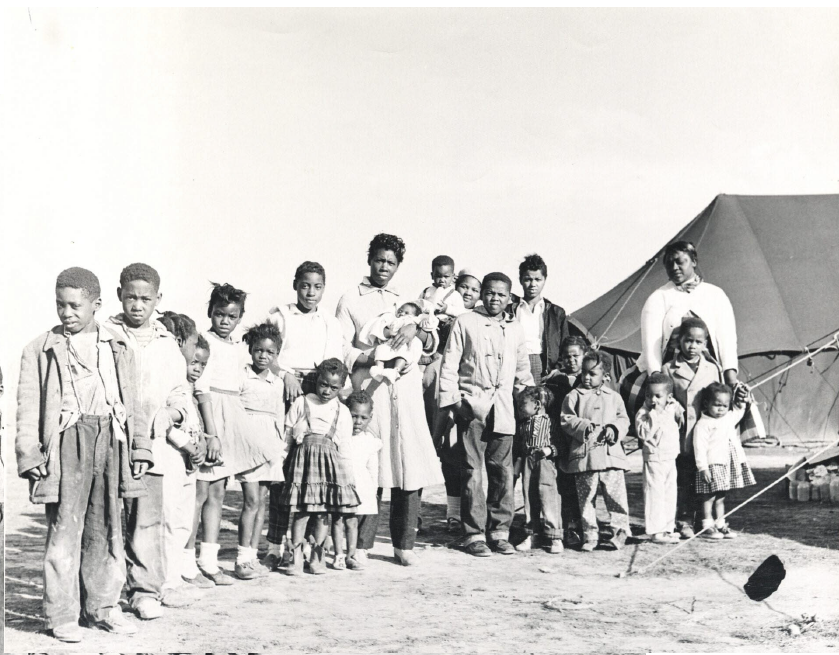Yet another act of white aggression on black citizens in the United States was when African-Americans were evicted from their homes and blacklisted from buying amenities as retaliation for registering and voting during the Civil Rights Movement.
The expulsions led to the emergence of the Tent City, also called Freedom Village. It was an encampment outside of Memphis in Fayette County, Tennessee beginning in 1960, lasting for about two years to offer shelter to those who would have been at the mercy of the weather.
In 1960, fourteen hundred Black Americans registered to vote in deeply segregated Fayette County. As a retaliation, white landowners evicted 257 black sharecroppers from their homes but Shepard Towles, a local Black landowner, let the displaced farmers camp on his land.
According to Towles, “These people had nowhere to go. I decided to let them come in free, let them use the water from my deep well—as long as it lasts.” This became known as Tent City.
Concerned, John McFerren, Harpman Jameson, and J. F. Estes, a Memphis lawyer drove 22 hours to Washington to speak with John Doar of the U. S. Department of Justice’s Civil Rights Division. Doar promised legal action. They hoped the department would intervene on behalf of the sharecroppers since the Civil Rights Act of 1957 prohibits “against intimidating, coercing or otherwise interfering with the rights of persons to vote for the President and members of Congress.”
The white community retaliated further by refusing to sell groceries and other amenities to black registered voters. The media was McFerren’s next stop when he appealed to national newspapers to draw attention to the plight of residents in Tent City. Gulf, Texaco, and Esso also refused to deliver gasoline to McFerren’s store.
This prompted the NAACP to call for a national boycott of these chains. Attorney General Robert Kennedy ordered the Justice Department to investigate civil rights violations in Fayette County. The AFL-CIO published a pamphlet, Tent City… “Home of the Brave” calling for donations. A year on in 1961, trucks arrived with 150 tons of donated food and clothes.
The call for blacks to have the right to vote also enjoyed support from white civil rights advocates from the University of Wisconsin, Cornell University and the Religious Society of Friends (Quakers). Eventually black majority voter registration was achieved although the elections were still fixed in favor of whites. However, in the 1960 election, black voters swung the election and pulled the Republican Party into power in Fayette County for the first time in its history.
Earlie B. Williams and his family moved into the first tent on December 14, 1960. Eighty-one people from 11 families were housed in the ersatz settlement by March, 1961. The settlement was officially known as “Fayette County Freedom Village” but simply called “Tent City.”
Evictions continued until 345 families from Fayette and Haywood counties had been pushed into homelessness. A second “Tent City” sprouted 15 miles south on the Gertrude Beasley’s property near Moscow. Living conditions at both sites of Tent City made life challenging as most families had left their homes in early winter with only the barest essentials.
In 1960, Blacks made up 70% of the population in Fayette County yet before 1959 fewer than 50 had ever registered. Meanwhile, the Freedom Village disintegrated when residents moved with other black families or relocated to other parts of Tennessee.

Fayette County was the very first voter registration drive conducted among black citizens in the rural South. In May, 1960, though black citizens registered in Fayette County the previous year, Haywood County opened its books to black registrants for the first time since Reconstruction.
The situations in these two west Tennessee counties were contributing factors to the passage of the Civil Rights Act of 1960.
The Justice Department filed charges against 27 local businesses and two banks in Haywood County, charging them with using economic pressure to discourage black citizens from voting.










